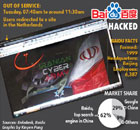Economy
China raises reserve ratio by 0.5 percentage points
(Agencies)
Updated: 2010-01-12 20:49
 |
Large Medium Small |
BEIJING: China's central bank moved to tighten monetary policy Tuesday, raising the bank reserve requirement ratio by 0.5 percentage points and slightly increasing the interest rate on its one-year bill by 8 basis points to 1.84 percent.
The credit-tightening moves reflect concerns over a possible rise in inflation this year as China's economy continues to rebound from the global financial crisis.
Agricultural credit cooperatives and other rural financial institutions were exempt from the increase to ensure adequate financing for the spring planting, the People's Bank of China said in a brief statement on its Web site. Their ratio rate remained at 13.5 percent, according to Hexun.com.
The boost in the interest rate on the one-year bill was the first since August. The central bank had already raised the rate for its three-month bills on Thursday from 1.3280 percent to 1.3684 percent.
"This series of moves by the central bank provides a clear sign that policymakers are following through on their pledge to guide credit in order to pre-empt rising inflation and avoid asset price bubbles," Jing Ulrich, head of China equities at J.P. Morgan, said in a report.
Despite Tuesday's moves, the main Shanghai stock index jumped 61.22 points, or 1.9 percent, to 3,273.97 on Tuesday. The index ended 2009 with an annual gain of 80 percent following a year of heavy government stimulus spending and bank lending.
Chinese banks issued 8.95 trillion yuan ($1.3 trillion) in new loans in January-October, up from a total of 4.2 trillion yuan the year before. Meanwhile, inflows of outside capital are adding to inflationary pressures, especially in real estate and stocks.
With plenty of money sloshing around, soaring housing prices in Beijing, Shanghai and other major cities have reawakened fears that asset bubbles and inflation could set the economy spinning.
Food prices, always sensitive in this crowded nation of 1.3 billion people, have also edged higher, with speculators buying up stocks of garlic and other staples.
After nine months of falling prices, the cost of consumer goods rose by 0.6 percent in November from the same month a year earlier.
Amid the global financial meltdown, China's 4 trillion yuan ($586 billion) government stimulus kept its economy and consumption growing while the US and other markets struggled with recession.
Chinese economic growth rose to 8.9 percent in the third quarter of 2009?- after dipping to a low of 6.1 percent in the first quarter?- and the government is forecasting a full-year expansion of 8.3 percent.
China's economy is expected to unseat Japan as No. 2 behind the United States as early as this year, while its trade boom has helped Beijing pile up the world's biggest foreign currency reserves at more than $2 trillion.
On Friday, data released by an industry group showed China topped the slumping United States in auto sales in 2009?- a status industry analysts a few years ago did not expect it to achieve until as late as 2020.
China's trade ended 2009 with exports rebounding in December, jumping 17.7 percent after 13 months of declines.












